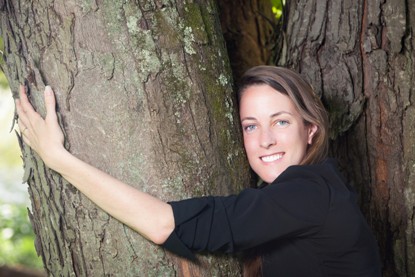An Excerpt from “Under the Open Sky,” the Second Chapter of Cerulean Blues: A Personal Search for a Vanishing Songbird.
Cerulean Blues: A Personal Search for a Vanishing Songbird. Nonfiction by Katie Fallon. Ruka Press. October 18, 2011. Paper: 224 pages; $17.95.
I hit the refresh icon again and noticed that the casualty list had been updated. I recognized one of the just-added names, but second-guessed myself. Same last name, same first name. But that can’t be my Rachael, I thought. Not the Rachael with the brilliant smile whom I’d taught in a freshman English class the previous semester. Not the intelligent young woman who sometimes lamented the traffic problems around her hometown, who wrote about her love of quiet, pre-dawn mornings. I forced myself to focus. The website also listed an age: eighteen. And a hometown, which I recognized.
The room dissolved. I could suddenly see her sitting cross-legged on the floor of the hallway outside our classroom in McBryde Hall, her back against the wall, waiting for the students in the class before ours to clear out. She’d be wearing jeans and a Virginia Tech sweatshirt. Her shoulder-length brown hair, the color of chestnuts, would be tucked behind her ears. Her elbows would rest on her knees, and her head would be bent over the novel she’d be reading. She’d look up, smile at me and say hello, and then resume reading. When we’d finally get into the classroom, I’d drop my bags on the front desk, she would set her backpack on the floor, and the two of us would arrange the desks in a circle before the other students arrived.
Rachael took notes. She paid attention. She never rolled her eyes, she came to office hours, she volunteered to read aloud when no one else would. She had perfect attendance for the semester. Even during the most tedious of lectures on MLA citation or logical fallacies, I could look across the circle at her, and she would be listening, textbook open on her desk. She wasn’t afraid to make eye contact. She had a quiet confidence and a level of maturity rare among college freshmen. She was poised, focused, respectful, and kind. Her beautiful smile could brighten a boring class. And she smiled often.
“Oh no,” I said. I started to shake. Jesse was next to me on the couch. My mouth twisted. I stammered a few times and tried to say something about Rachael, about her smile, about her intelligence, but instead, I think I said, “She was probably sitting in the front row.” My mind rushed to a horrible place and filled with images of chaos and overturned desks and arms, legs, blood. “Oh no,” I said again, and then sobbed.
I’m not sure about the order of the rest of the week’s events. I know I cried a lot and slept little. We watched news reports, went to vigils, wept at convocations; it felt like everything good had been drained from the world. At times, my mind felt like a vacuum—totally empty of everything, hollow and useless. At other times, questions rushed in. Between the murders at the dormitory and at Norris Hall, the shooter went downtown to the Blacksburg Post Office to mail his manifesto to NBC; why, after mailing the package, didn’t he stop in the English Department? Had Kara been behind him in line as she waited to mail her taxes? I must have passed him many times in the hallways of the department over the last three years. Why didn’t he go to the building that held his professors’ offices? Who would he have found at nine o’clock on that Monday morning, shuffling around her office, checking email, heating water for tea in the microwave?
The university decided that classes would meet during the last two weeks of the semester. Our department invited counselors to a faculty meeting to help us know what to say to our students. At the meeting, we were told that we could request counselors to come with us to our classes, and counselors would automatically be sent to classes where there would be empty desks. Empty desks. I didn’t hear much of anything else he said until the question and answer session at the end of the meeting. One of my colleagues asked if we were allowed to hug our students. The counselor told us that if we weren’t sure, we should “err on the side of the hug.” While it was the best advice I’d heard in a long time, it only added to the surreality; what kind of bizarre world did we live in? It might not be appropriate for a professor to hug a grieving adult student, but apparently it was appropriate—and legal—for someone with a history of mental illness and extreme antisocial behavior to purchase semiautomatic handguns.
The following Tuesday I was afraid to go to class. I considered canceling my classes and giving all of my students automatic A’s. What if someone wanted to further terrorize us by repeating the events of the previous week? One of the classrooms that I taught in didn’t have windows or a lock—should I push the instructor’s desk in front of the door? I’d never been afraid to go to work before. What would I say to my traumatized, beautiful students? They’d be looking to me for some sort of guidance, wouldn’t they? What if I said the wrong things? What if none of them showed up?
When I walked into my first classroom, I was surprised to see all but one or two of my students. They seemed eager to see each other, to see me, and to have a chance to talk. I gave them handouts about counseling services on campus and about the symptoms of Post Traumatic Stress Disorder. I told them about Rachael. I cried. I admitted that I hadn’t been sleeping, that my stomach hurt, and that I had to turn off an episode of CSI. I gave them each a copy of Wendell Berry’s soothing poem “The Peace of Wild Things,” and as my classes ended, I erred on the side of the hug and embraced every one of my students, except for a young man who said he’d cry if he hugged me, and he didn’t want to cry in front of people.
I dreaded walking past Norris Hall, but I had to in order to get to my second class. My feet felt heavy as I approached its looming countenance. I had an hour-long break between classes, during which I forced myself to sit on a bench near the building’s backside. A new chain-link fence covered in green mesh encased the entire structure, so no one could really see in. Students rushed by en route to class. Most avoided looking at Norris. Two young women, walking together, laughed and talked. It was an odd sound. The landscaped daffodils were all dead. Their green stalks remained, but the flowers had dropped some days before.
Yellow police tape was stretched around the outside of the fence and wrapped around the thick trunks of tulip trees. CRIME SCENE DO NOT CROSS CRIME SCENE DO NOT CROSS… From inside the fence, I heard a bird singing. At first, the twangy song sounded like a mockingbird, but then I realized it was a grey catbird, the first I’d heard that season. He had probably recently arrived from points south. What did he think of all this yellow tape? I imagined him wooing a mate, building a nest, and raising young birds, all inside the police boundary. The possibility of new, fragile life—so close to where so many lives had brutally ended—seemed impossible.
I stared at the towering tulip trees and imagined a forest full of them. An old-growth, hardwood forest, thick with oaks and maples, hickories and buckeyes. For the first time in more than a week, I thought about cerulean warblers. In light of everything that had happened, it felt petty to have been so worried about them during the storm, so consumed by their fate. Surely most survived the nor’easter—but perhaps not the ones most determined to arrive here first, perhaps not the strongest and the brightest.
My eyes followed the tulip tree trunks up towards their crowns. I noticed they were taller than Norris. The building stopped, but the trees kept going, reaching sunward, stretching into the sky. I ran my gaze back down their trunks to where they met the earth; their roots had caused the sidewalk to crack. I visualized them plunging deep into the ground, below Norris’s foundation. Compared to the trees, the building suddenly seemed small and impermanent. I felt the sun’s warmth in the metal bench under me.
I forced my eyes to the building’s second floor windows. I wanted to make some personal vow, to reach a revelation, but I kept coming back to the trees. The trees, the catbird, the dead flowers. Students hurrying past. A state police officer standing guard near an opening in the chain-link fence. I’d knew I’d find a way to go on, but I also knew that everything would be different—for Virginia Tech, for our students and faculty, for me.

Katie Fallon is the author of the nonfiction book Cerulean Blues: A Personal Search for a Vanishing Songbird. The book, published by Ruka Press, was released on October 18, 2011. Katie’s essays have appeared in a variety of literary journals and magazines, including The Bark, Fourth Genre, River Teeth, Ecotone, Appalachian Heritage, Now & Then, Isotope, and elsewhere. The editors of Fourth River nominated her for a Pushcart Prize for her essay “Lost.” Currently, Katie teaches creative writing at West Virginia University; from 2004-2011 she taught at Virginia Tech in Blacksburg, VA.
